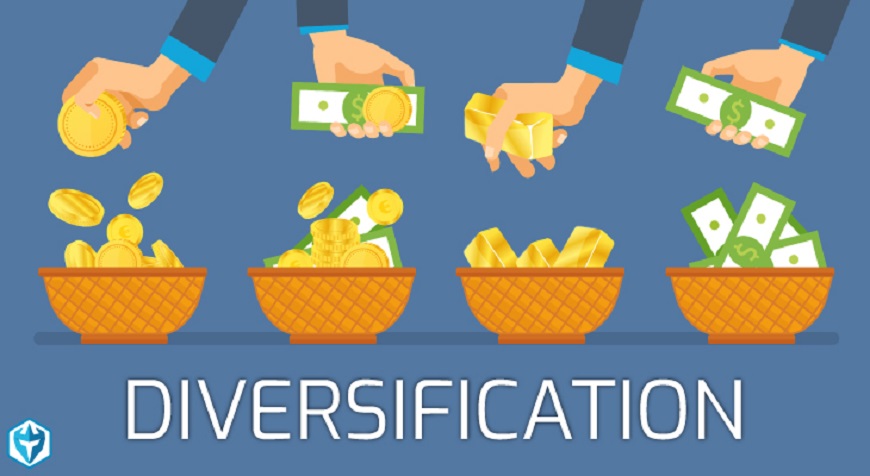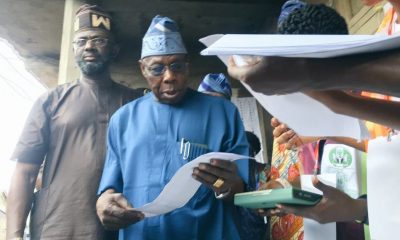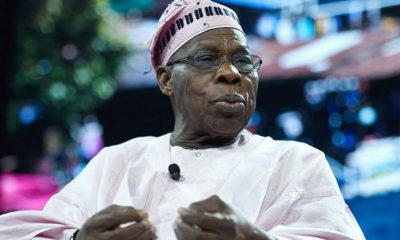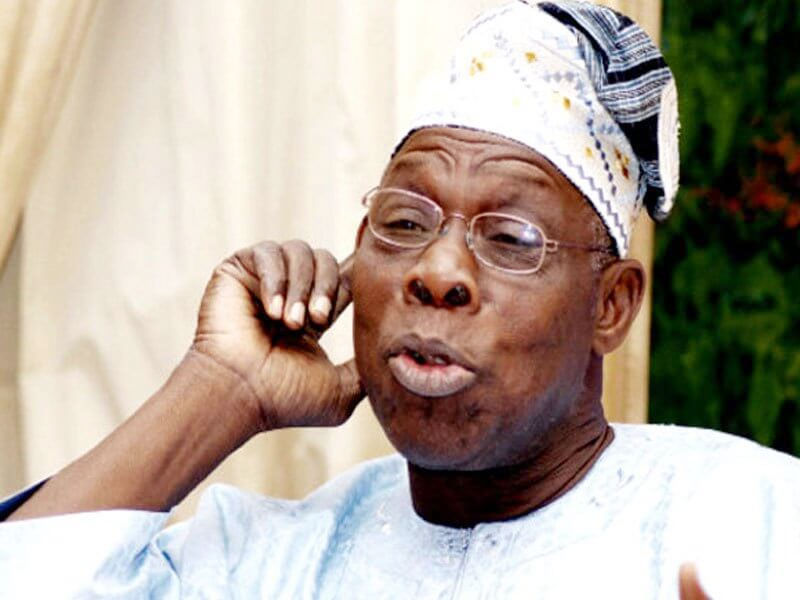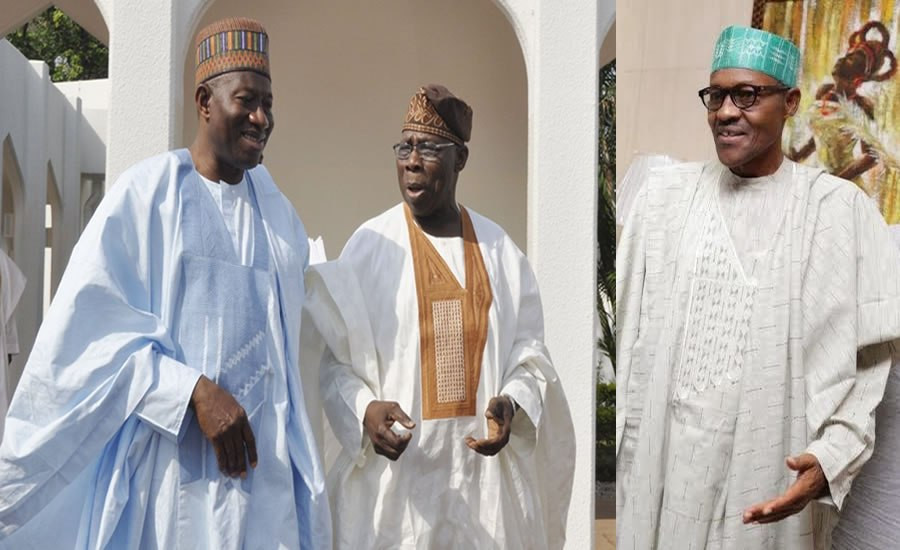Feature/OPED
Aremu’s Letter and Matters Arising
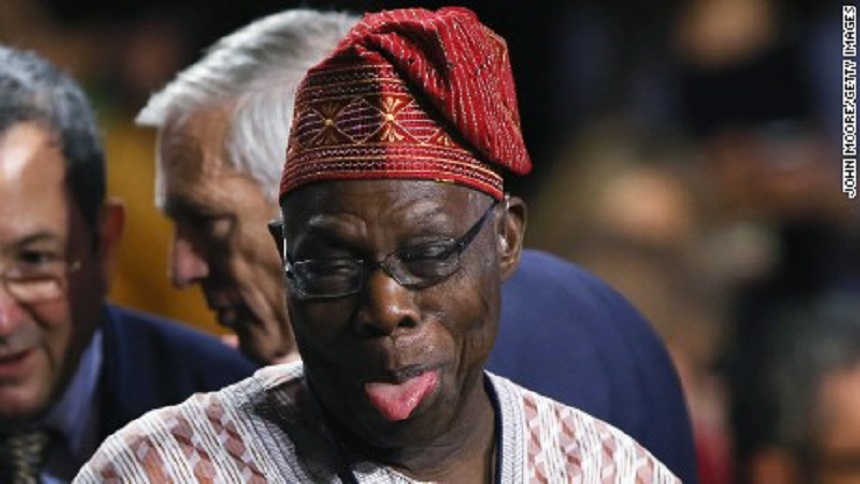
By Oladimeji Odeyemi
Those who are students of history particularly that of Yoruba history will remember the very Didactic story of a certain kingmaker in the Old Oyo Empire in Circa 1750 that was responsible for the installation of four Alaafins; Labisi, Awonbioju, Agboluaje and Majeogbe and also killed them all.
To the discerning and prescient mind, a certain parallel is to be found in the story of Bashorun Gaa and Chief Olusegun Aremu Obasanjo (former President of Nigeria), both kingmakers at different times and eras, yet possessing the same mindset and idiosyncrasies — a certain human function no doubt, which pretends to be something that is not.
In the old Oyo Empire, the Bashorun or Iba Osorun is the head of the cabinet cum legislators, upon whom the burden of administering the realm and also selecting the kings are rested.
There arose a powerful head of the kingmakers, through deft hands and carefully attained integrity status, Gaa, who became powerful enough to be deemed dependable to make choices on behalf of the rest.
So Gaa chose Labisi to be Alaafin. Labisi, a man of immense insight and managerial dexterity, extended the frontiers of the Yoruba empire from the banks of the Niger River to the shores of the Volta River in Ghana, where today a Yoruba king, The Oninana of the Gas people near Accra, reigns on the authority of the Alaafin made possible by Labisi, yet Bashorun Gaa got rid of him.
The other three Alaafins were in no fashion less in greatness than Labisi but Gaa Osorun got rid of them all.
How was he able to do these things? you might ask. Just as you might ask by what means has Chief Obasanjo become a factor in who becomes who and who is politically removed from office in Nigeria. The answers are very much about the same tact, methodology.
Gaa achieved this feat by pretence, pretending to be a defender of the common man, defending the commonwealth, fighting for the liberty of all and protecting the rights of every individual were the premises upon which Gaa acted.
Just like Obasanjo acts and speaks as the ombudsman, the defender of the masses and the protector of our collective liberal, but are they what they claim to be?
Bashorun Gaa was a rich man per excellence, far richer that he pretended to be, far more egoistic but never altruistic. What drove Bashorun Gaa was the control syndrome and quest for authority that flows from his wiles. He was the master of Service-To-Self, it was the binding rule that what Gaa wants, Gaa gets.
In the period that Chief Olusegun Aremu Obasanjo emerged unto the Nigerian national scene from the time of civil war, a clear pattern has also emerged. A clear pathological egoism, laced with psychological hedonism much like the life and style of Bashorun Gaa.
In all of Obasanjo’s books, it is easy to see a man of immense ego.
Right from his book, ‘My Command’, a memoir about his exploits in the civil war, Obasanjo blamed every commander and active officer he could remember and praised himself alone — From Shuwa, to Alabi-Isama, Benjamin Adekunle and to even Murtala Mohammed, Obasanjo lambasted all, saving all the glory to himself alone.
In his last book, ‘My Watch’, Obasanjo shifted the blame of his failed 3rd term presidential bid on the governors who he said were the ones who wanted him to continue to be president for the unprecedented and unconstitutional 3rd term and not himself.
When Obasanjo, as a military Head of State, relinquished power to Alhaji Shehu Shagari in 1979, one would have thought the accident of his own emergence as a Head of State would have been quite compelling and humbling to ease his ego tripping, but he did not wait before writing in his book quite unnecessarily that as Chief Awolowo strived ever so hard to be president, providence made him, Obasanjo Head of State without asking for it. How much higher in ego massaging can anyone else get to in comparison with a master in hedonism?
It gives Obasanjo such pleasure to be seen in competition in which he can also safely declares himself the winner.
Many of his colleagues in the military and also others who have observed Obasanjo’s massive ego tripping have written about this, which I call the Obasanjo complex.
In the game of squash-racket in which two players knock a ball against the wall, a game Obasanjo loves, his opponents know the rules — you dare not play to win against Obasanjo, it is a taboo!
Historians have documented the hedonistic saga of Bashorun Gaa and a very important part of the books written on this kingmaker is his usual treaties after getting rid of yet another king, “Ija ilu ni Gaa n’gbe, Gaa o pa yin l’oba he Ooo.! “It is but the cause of the citizenry that drives Gaa to act in the manner that leads the king to be removed, it is not about Gaa wanting the king dead”.
Such was how Gaa Osorun was wont to say; such as the same way Chief Obasanjo has been saying it ever since he wrote his first letter to Alhaji Shehu Shagari, barely 3 years into his four year 1st term in office; always claiming it is for the common good and for the sake of nationhood has Obasanjo basing his letters to every President or Head of State to have emerged, ever since.
Obasanjo, Egoism and Hedonism
Psychological egoism is the view that humans are always motivated by self-interest, even in what seem to be acts of altruism. It claims that, when people choose to help others, they do so ultimately because of the personal benefits that they themselves expect to obtain, directly or indirectly, from doing so.
In the same manner is pathological hedonism, the view that the ultimate motive for all voluntary human action is the desire to experience pleasure or to avoid pain.
In both lies the Obasanjo complex; a mix of Service-To-Self and the gratification of pleasure in been seen as high and above everybody else.
In the Bashorun Gaa parallel, this same mix played out as the only Alaafin to survive Gaa antics, Alaafin Abiodun subjected himself seemingly to be under Gaa’s influence but prostrating to the Osorun, which is unheard of for an Oba to prostrate let alone the head of the empire to do so to anyone.
Though the Bashorun did not live in the era of letter writing, he employed much the same vending of publicly berating the king, rather than a more dignified purposeful altruistic private admonition.
Chief Obasanjo who has had a hand in the making of all the three presidents who have succeeded him, and with his position as a former president, has an unrestrained, unfettered, unrestricted access to whoever is President. But not unlike the hedonistic Gaa, Obasanjo has chosen and repeatedly so, to rush to press anytime he personally feels there should be a change of government.
Unto all Presidents A letter
That Chief Olusegun Aremu Obasanjo has written to all Presidents since President Shagari in 1982 is not the question, that he has yet written such a letter at these times and yet again is our focus. And why this letter should be seen as suspect is the reason for this article.
Comrade Oladimeji Odeyemi is the President of National Committee of Yoruba Youth (NCYY) and the Convener of the Coalition of Civil Society Groups against Terrorism in Nigeria sent this article from Ibadan.
Feature/OPED
If Dangote Must Start Somewhere, Let It Be Electricity

By Isah Kamisu Madachi
The news that the Nigerian businessman, Aliko Dangote, plans to expand his business interest into steel production, electricity generation, and port development as part of his broader ambition to accelerate industrialisation in Africa deserves a quick reflection on the promises it carries for Nigeria. It is coming from Dangote at a time when many African countries, including Nigeria, are still struggling with below-average industrial capacity. This move speaks to something important about how prosperity is actually built.
In their Influential book ‘The Prosperity Paradox: How Innovation Can Lift Nations Out of Poverty,’ Clayton Christensen, Efosa Ojomo, and Karen Dillon argue that countries rarely overcome poverty through aid, policy declarations or resource endowments alone. According to them, the effective engine of prosperity has always been market-creating innovations by private and public enterprises that build new industries, generate jobs, and expand economic opportunities for ordinary people.
Even though their theory focuses largely on creating something new or producing it exceptionally, Dangote’s new industrial ambition seems closer to the latter. It is about producing essential things at a scale and efficiency that the existing system has failed to achieve.
Take, for example, the electricity sector in Nigeria. Since the beginning of the current Fourth Republic, billions of dollars have been allocated to power sector reforms, yet electricity supply remains unstable, and many Nigerians still depend heavily on generators to power their homes and businesses. The situation has continued to deteriorate despite the enormous resources committed to the sector by the coming of every new administration.
This is not surprising. In The Prosperity Paradox, the authors explain how nations and even international organisations sometimes keep investing huge resources in certain activities only to realise much later that they were simply hitting the wrong target. The problem is not always the lack of funding; sometimes it is the absence of a functioning market system capable of producing and distributing essential services efficiently.
Seen from this perspective, Dangote’s move into electricity generation may mean more than just an investment. It could be an attempt to tackle one of the most critically lingering bottlenecks in Nigeria’s economic development. If I were to be asked to decide which sector Dangote should begin with in this new industrial plan, I would unhesitatingly choose electricity. It is the most embattled, deeply corrupted and seemingly jeopardised beyond repair, yet the most important sector for the everyday life of citizens.
Stable electricity has the power to transform productivity across every sector. When power supply becomes reliable, small businesses are created, productivity is boosted across all sectors, and households enjoy a better quality of life. Nigeria’s long-standing energy poverty has been strangulating the productive potential of millions of people for decades. Fixing that problem alone would unlock enormous economic possibilities more than expected.
Beyond the issue of productivity, Dangote’s entry into these sectors could also stimulate competition. Healthy competition is one of the most effective drivers of efficiency in any economy. The example of the refinery project already shows how a large-scale private investment can disrupt long-standing structural weaknesses within a sector. A similar dynamic in the proposed sectors could encourage other investors to participate and expand industrial capacity.
Nigeria, by 2030, is projected to need 30 to 40 million new jobs to absorb its rapidly growing population. The scale of this challenge means that the government alone, especially in the Nigerian context, cannot create the necessary opportunities to fill this gap. Private enterprises will have to play a major role in expanding productive sectors of the economy. If supported by the right policy environment, they could contribute significantly to narrowing Nigeria’s widening job gap.
Of course, no single business initiative can solve all structural challenges in the economy. But bold investments of this nature often serve as catalysts for broader economic transformation. With the right support and healthy competition from other investors, initiatives like these could help push Nigeria closer to the kind of industrial foundation that many developed economies built decades ago.
In the end, the lesson is simple: prosperity rarely emerges from policy debates alone. It often begins with large-scale productive ventures that reshape markets, unlock productivity at both small-scale and large-scale businesses, and create direct and indirect economic opportunities for millions of common men and women.
Isah Kamisu Madachi is a policy analyst and development practitioner. He writes via is***************@***il.com
Feature/OPED
Love, Culture, and the New Era of Televised Weddings

Weddings have always held a special place in African culture. They are more than ceremonies; they are declarations of love, family, identity, and tradition. From the vibrant colours of aso-ebi to the rhythmic sounds of live bands and the emotional exchange of vows, weddings represent a moment of cultural heritage.
In recent years, weddings have gone beyond physical venues. What was once an exclusive gathering for family and friends has transformed into a shared experience for wider audiences. Social media first opened the door, allowing guests and admirers to witness love stories in real time through Instagram posts, TikTok highlights, and YouTube recaps.
And now, television platforms are taking this even further, giving weddings a new kind of permanence and reach.
High-profile weddings, like the widely celebrated union of Adeyemi Idowu, popularly known as Yhemolee (Olowo Eko) and his wife Oyindamola, fondly known as ThayourB, captured massive public attention. Moments from their wedding became a live shared experience on television (GOtv & DStv).
From the high fashion statements to the emotional highlights, viewers were able to feel part of something bigger, a reminder that weddings inspire not just both families but entire communities.
This shift reflects a broader reality: weddings today are content. They inspire conversations about fashion, relationships, lifestyle, and aspiration. They preserve memories in ways previous generations could only imagine. For Gen Z couples, their wedding is no longer just a day; it becomes a story that can be revisited, celebrated, and even inspire others planning their own journey to forever.
Broadcast platforms like GOtv are playing a meaningful role in this transformation. By bringing wedding-related content directly into homes, GOtv is helping audiences experience these moments not just through social media snippets but in real time.
One of the most notable offerings is Channel 105, The Wedding Channel, Africa’s first 24-hour wedding channel, available on GOtv. The channel is fully dedicated to African weddings, lifestyle, and bridal fashion, showcasing everything from dream ceremonies to the realities of married life. Programs like Wedding Police and Wedding on a Budget, and shows like 5 Years Later, offer a deeper look into marriage itself, reminding viewers that weddings are just the beginning of a lifelong journey.
GOtv is preserving culture, celebrating love, and inspiring future couples with this channel. It allows viewers to witness traditions from different regions, discover new ideas, and feel connected to moments that might otherwise remain private.
With platforms like GOtv, stories continue to live on screens across Africa, where love, culture, and celebration can be experienced by all.
To upgrade, subscribe, or reconnect, download the MyGOtv App or dial *288#. For catch-up and on-the-go viewing, download the GOtv Stream App and enjoy your favourite shows anytime, anywhere.
Feature/OPED
Brent’s Jump Collides with CBN Easing, Exposes Policy-lag Arbitrage

Nigeria is entering a timing-sensitive macro set-up as the oil complex reprices disruption risk and the US dollar firms. Brent moved violently this week, settling at $77.74 on 02 March, up 6.68% on the day, after trading as high as $82.37 before settling around $78.07 on 3 March. For Nigeria, the immediate hook is the overlap with domestic policy: the Central Bank of Nigeria (CBN) has just cut its Monetary Policy Rate (MPR) by 50 basis points to 26.50%, whilst headline inflation is still 15.10% year on year in January.
“Investors often talk about Nigeria as an oil story, but the market response is frequently a timing story,” said David Barrett, Chief Executive Officer, EBC Financial Group (UK) Ltd. “When the pass-through clock runs ahead of the policy clock, inflation risk, and United States Dollar (USD) demand can show up before any oil benefit is felt in day-to-day liquidity.”
Policy and Pricing Regime Shift: One Shock, Different Clocks
EBC Financial Group (“EBC”) frames Nigeria’s current set-up as “policy-lag arbitrage”: the same external energy shock can hit domestic costs, FX liquidity, and monetary transmission on different timelines. A risk premium that begins in crude can quickly show up in delivered costs through freight and insurance, and EBC notes that downstream pressure has been visible in refined markets, with jet fuel and diesel cash premiums hitting multi-year highs.
Market Impact: Oil Support is Conditional, Pass-through is Not
EBC points out that higher crude is not automatically supportive of the naira in the short run because “oil buffer” depends on how quickly external receipts translate into market-clearing USD liquidity. Recent price action illustrates the sensitivity: the naira was quoted at 1,344 per dollar on the official market on 19 February, compared with 1,357 a week earlier, whilst street trading was cited around 1,385.
At the same time, Nigeria’s inflation channel can move quickly even during disinflation: headline inflation eased to 15.10% in January from 15.15% in December, and food inflation slowed to 8.89% from 10.84%, but energy-led transport and logistics costs can reintroduce pressure if the risk premium persists. EBC also points to a broader Nigeria-specific reality: the economy grew 4.07% year on year in 4Q25, with the oil sector expanding 6.79% and non-oil 3.99%, whilst average daily oil production slipped to 1.58 million bpd from 1.64 million bpd in 3Q25. That mix supports external-balance potential, but it also underscores why the domestic liquidity benefit can arrive with a lag.
Nigeria’s Buffer Looks Stronger, but It Does Not Eliminate Sequencing Risk
EBC sees that near-term external resilience is improving. The CBN Governor said gross external reserves rose to USD 50.45 billion as of 16 February 2026, equivalent to 9.68 months of import cover for goods and services. Even so, EBC views the market’s focus as pragmatic: in a risk-off tape, investors tend to price the order of transmission, not the eventual balance-of-payments benefit.
In the near term, EBC expects attention to rotate to scheduled energy and policy signposts that can confirm whether the current repricing is a short, violent adjustment or a more durable regime shift, including the U.S. Energy Information Administration (EIA) Short-Term Energy Outlook (10 March 2026), OPEC’s Monthly Oil Market Report (11 March 2026), and the U.S. Federal Reserve meeting (17 to 18 March 2026). On the domestic calendar, the CBN’s published schedule points to the next Monetary Policy Committee meeting on 19 to 20 May 2026.
Risk Frame: The Market Prices the Lag, Not the Headline
EBC cautions that outcomes are asymmetric. A rapid de-escalation could compress the crude risk premium quickly, but once freight, insurance, and hedging behaviour adjust, second-round effects can linger through inflation uncertainty and a more persistent USD bid.
“Oil can act as a shock absorber for Nigeria, but only when the liquidity channel is working,” Barrett added. “If USD conditions tighten first and domestic pass-through accelerates, the market prices the lag, not the headline oil price.”
Brent remains an anchor instrument for tracking this timing risk because it links energy-led inflation expectations, USD liquidity, and emerging-market risk appetite in one market. EBC Commodities offering provides access to Brent Crude Spot (XBRUSD) via its trading platform for following energy-driven macro volatility through a single instrument.
-

 Feature/OPED6 years ago
Feature/OPED6 years agoDavos was Different this year
-
Travel/Tourism10 years ago
Lagos Seals Western Lodge Hotel In Ikorodu
-

 Showbiz3 years ago
Showbiz3 years agoEstranged Lover Releases Videos of Empress Njamah Bathing
-

 Banking8 years ago
Banking8 years agoSort Codes of GTBank Branches in Nigeria
-

 Economy3 years ago
Economy3 years agoSubsidy Removal: CNG at N130 Per Litre Cheaper Than Petrol—IPMAN
-

 Banking3 years ago
Banking3 years agoSort Codes of UBA Branches in Nigeria
-

 Banking3 years ago
Banking3 years agoFirst Bank Announces Planned Downtime
-

 Sports3 years ago
Sports3 years agoHighest Paid Nigerian Footballer – How Much Do Nigerian Footballers Earn




